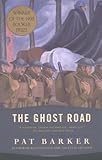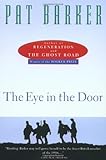 I put off reading Pat Barker’s Regeneration trilogy for a long time, even though I loved the first book in the series when I encountered it in my early 20s, even though I began researching World War I for a writing project of my own three years ago. I suspected that the trilogy would be very good, and, sometimes, very good books make me nervous. Usually I feel all of the things one should: invigorated, my faith in literature (and even life!) restored to such a degree that all of the frustrations of fiction writing feel worth it. But there are also times when a book is too good, when I begin think, what’s the point? No matter how hard I work I’ll never be able to do this.
I put off reading Pat Barker’s Regeneration trilogy for a long time, even though I loved the first book in the series when I encountered it in my early 20s, even though I began researching World War I for a writing project of my own three years ago. I suspected that the trilogy would be very good, and, sometimes, very good books make me nervous. Usually I feel all of the things one should: invigorated, my faith in literature (and even life!) restored to such a degree that all of the frustrations of fiction writing feel worth it. But there are also times when a book is too good, when I begin think, what’s the point? No matter how hard I work I’ll never be able to do this.

 Regeneration tells the story of Dr. W.H. Rivers and the shell-shocked officers he treats during World War I; some of these patients are historical figures like Rivers himself (Siegfried Sassoon and Wilfred Owen among them), others, like the series’s second protagonist, Billy Prior, are invented. The two subsequent novels, The Eye in The Door and the Booker-prize-winning The Ghost Road, follow Rivers and Prior through the slums of Manchester, the wards of military hospitals, the Ministry of Munitions, the South Seas, and eventually back to the Front, all while investigating questions of class, loyalty, platonic and erotic love between men, the ethics of pacifism, sanity, and western notions of death. Yeah, This is a lot to chew on, but the novels never feel overwhelming or artificial because Rivers and Prior are both so deeply human. Like the books they inhabit, these characters are empathetic but never sentimental, inquisitive but never didactic.
Regeneration tells the story of Dr. W.H. Rivers and the shell-shocked officers he treats during World War I; some of these patients are historical figures like Rivers himself (Siegfried Sassoon and Wilfred Owen among them), others, like the series’s second protagonist, Billy Prior, are invented. The two subsequent novels, The Eye in The Door and the Booker-prize-winning The Ghost Road, follow Rivers and Prior through the slums of Manchester, the wards of military hospitals, the Ministry of Munitions, the South Seas, and eventually back to the Front, all while investigating questions of class, loyalty, platonic and erotic love between men, the ethics of pacifism, sanity, and western notions of death. Yeah, This is a lot to chew on, but the novels never feel overwhelming or artificial because Rivers and Prior are both so deeply human. Like the books they inhabit, these characters are empathetic but never sentimental, inquisitive but never didactic.
Which is all to say that Regeneration was every bit as good as I remembered, and the following two books were even better than I’d hoped and feared. Barker’s prose is sharp and precise, her dialogue natural and often slyly funny. She incorporates an astonishing breadth of historical detail into her story in a manner that feels measured and effortless and devastatingly real. And then after 600 pages of moving but restrained third-person narration, Barker gives herself permission to leap into the voice of Billy Prior (via his journal), who writes the following after a horrific day on the front line:
And I stumbled along at the head of the company and I waited for the sun to go down. And the sodden thing didn’t. IT ROSE. It wasn’t just me. I looked on every face. We hadn’t slept for four days. Tiredness like that is another world just like the noise, the noise of bombardment, isn’t like other noise. You see people wade through it, lean into it. I honestly think if the war went on for a hundred years another language would evolve, one that was capable of describing the sound of the bombardment or the buzzing of flies on a hot August day on the Somme. There are no words. There are no words for what I felt when I saw the setting sun rise.
Okay, Pat Barker. You win. I quit.
More from A Year in Reading 2012
Don’t miss: A Year in Reading 2011, 2010, 2009, 2008, 2007, 2006, 2005
The good stuff: The Millions’ Notable articles
The motherlode: The Millions’ Books and Reviews
Like what you see? Learn about 5 insanely easy ways to Support The Millions, and follow The Millions on Twitter, Facebook, Tumblr.









